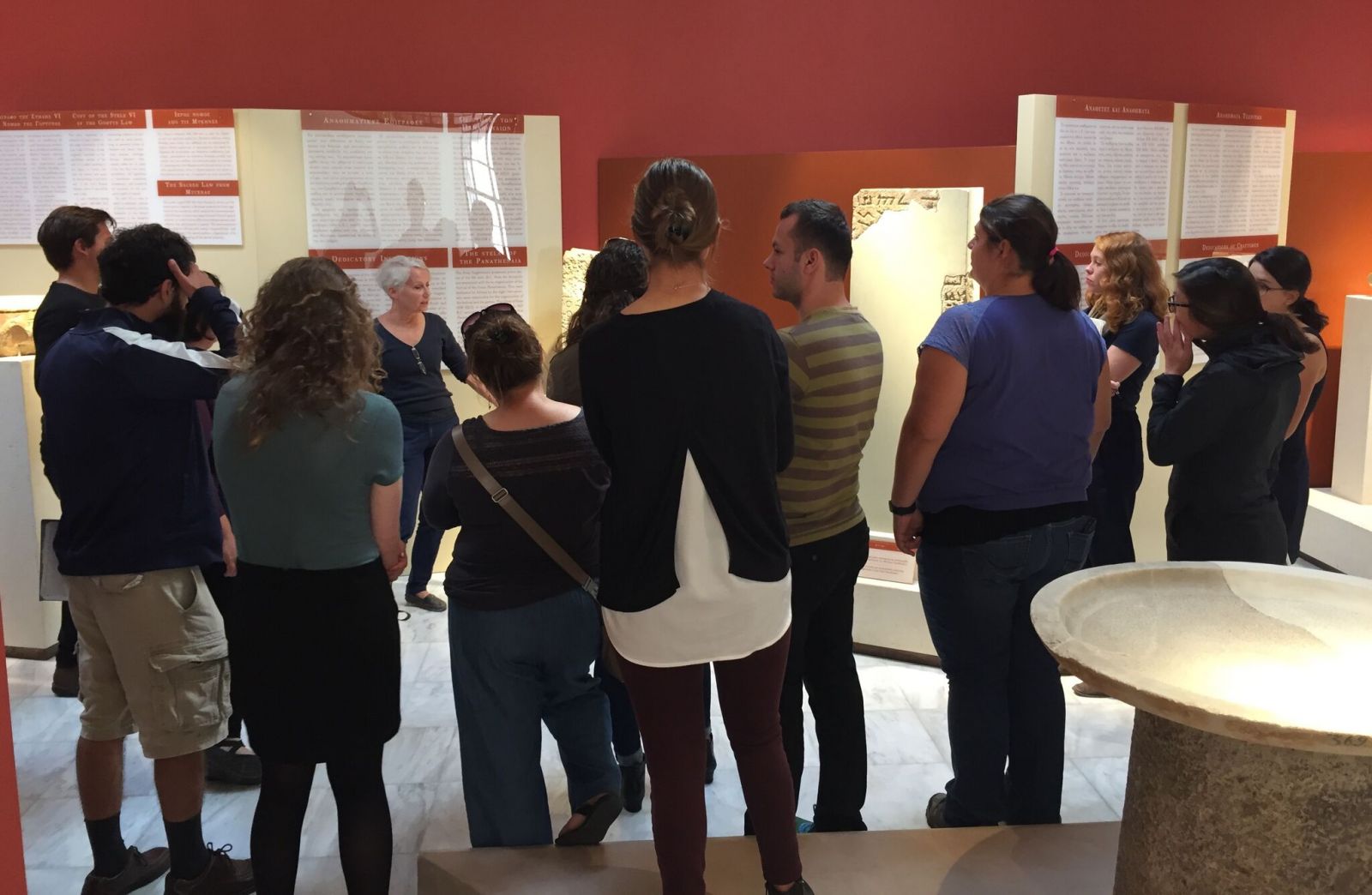Blog: Rethinking the Graduate Greek Survey
By Clara Bosak-Schroeder | August 9, 2022
When I learned that I would be teaching my department’s graduate Greek survey in Fall 2021, I promptly burst into tears. The assignment was not what I was expecting; more painfully, it brought up all the barely suppressed memories of my own survey experience.
Blog: Review: Cambridge Greek Lexicon
By Thomas Hendrickson | February 15, 2022
The Cambridge Greek Lexicon (CGL) set out to replace the Middle Liddell, a goal whose overwhelming success cannot be in doubt. Indeed, it puts the field of classical studies in the awkward position of having a student dictionary that is on sounder footing than its chief scholarly dictionary, and it seems likely that CGL will be the go-to resource not just for undergraduates but for grad students and scholars when reading classical Greek literature.
Review: Perseus Digital Library Scaife Viewer
By Stephen Sansom | March 1, 2019
The Scaife Viewer of the Perseus Project pursues a simple goal: to provide a clear and enjoyable reading experience of the Greek and Latin texts and translations of the Perseus Digital Library. It is the first installment of Perseus 5.0 and eventually will replace Perseus’ current interface, Perseus Hopper, as the primary means for accessing the texts and translations of the Perseus library. In its goal to simplify access to Perseus’ repository of texts, the Scaife Viewer is a success. Its layout is uncluttered, its texts legible, its design refreshing. As a result, the Scaife Viewer is a welcome re-imagining of how users read Perseus texts.
Blog: A Short Note on the Renovated Epigraphic Museum in Athens
By Laura Gawlinski | December 10, 2018
Prof. Laura Gawlinski takes a look at the newly renovated Epigraphic Museum in Athens and notes the ways in which museums are working to make their holdings more accessible for students, teachers, and the public.

Renovated Room 11. Molly Richardson (ASCSA/ SEG) introduces the EM to members of the Regular Program of the American School of Classical Studies at Athens.
Review: Reviewing A Digital Edition of Homer
By Bill Beck | May 6, 2018
The Homer Multitext (HMT) has something in common with the poetry it documents: They are both monumental and impressive works whose gradual evolution over many years by many hands has left traces of its past; it exists in several forms that present the same information in slightly different ways, and its development through changing technologies has left occasional redundancies. Like the Iliad, it lives up to its title, but perhaps not in the way one expects. And like its poetic source text, it richly rewards those who plumb its depths.
Review: Brill Jacoby Online
By Matt Simonton | December 18, 2017
Jacoby Online is a monumental resource encompassing several separate projects, all of them related to Die Fragmente der griechischen Historiker (FGrH) of Felix Jacoby (1876–1959). The original reference work aimed to collect, edit, and comment on all the known testimonies[1] and fragments of ancient Greek historians whose works survive incomplete. At the time of his death, Jacoby had produced fifteen print volumes covering 856 historians, distributed among three of five proposed areas: (I) genealogy and mythography, (II) history (Zeitgeschichte), and (III) local history (Horographie) and ethnography.
Review: Packard Humanities Institute's Searchable Greek Inscriptions
By Laura Gawlinski | July 24, 2017
The Packard Humanities Institute’s Searchable Greek Inscriptions revolutionized the accessibility of ancient Greek epigraphic texts, first in CD-ROM format and then online since 2005. David Packard, Jr. initiated the project in the late 1980s as a collaboration between teams of scholars at Cornell University and The Ohio State University, and supported it financially through the Packard Humanities Institute (PHI). The original intent was to produce searchable texts of the well-over 200,000 inscriptions published in volumes like Inscriptiones Graecae (IG). The PHI editors did not aim to replace or fully re-edit the published editions of the texts, but did make corrections and standardize many inconsistencies.
Review: Suda On Line
By Joel Christensen | May 30, 2017
The idiosyncratic Greek encyclopedia from the 10th century CE known as “The Suda” (from the Greek word souda, meaning “fortress” or “stronghold”) is filled with fascinating assertions, cultural minutiae, and enough gossip for a lifetime of anecdotes. Suda On Line (SOL) is the first and only translation of the entire Suda into a modern language, and it presents in some ways a model for digital scholarship, even twenty years after its inception. A team of seven managing editors, seventy-five editors, and over 125 contributing translators created it (a history of the project is available here). SOL is open to contributions from users; each entry is marked with a history of who translated it, who provided comments, and what, if any, editorial interventions were performed later.
Review: Attic Inscriptions Online
By Alan Sheppard | May 22, 2017
Attic Inscriptions Online (AIO) presents translations of Attic inscriptions alongside cross-references to Greek texts, images, and notes. The website is the creation of Stephen Lambert and is affiliated with the Europeana Eagle Project. As of March 2017, AIO contains over 1,000 inscriptions with the eventual aim to provide translations of the 20,000+ inscriptions originating from Athens and Attica. The majority of the translations are by Lambert himself, with the remaining texts translated by a team of collaborators.
Review: Hodoi elektronikai
By Ben Gracy | January 23, 2017
Housed at the Université catholique de Louvain, Hodoi Elektronikai: Du texte à l'hypertexte is a freely-available digital repository of ancient Greek texts, intended especially for students of language and history. It is part of Leuven’s Bibliotheca Classica Selecta—overseen since 2015 by Paul-Augustin Deproost of Université catholique de Louvain—which also houses the Latin-language site Itinera Electronica. Bibliotheca Classica Selecta was begun in 1992, and the Greek texts were uploaded into the environnements hypertextes of Hodoi Elektronikai between 2005 and 2010.
